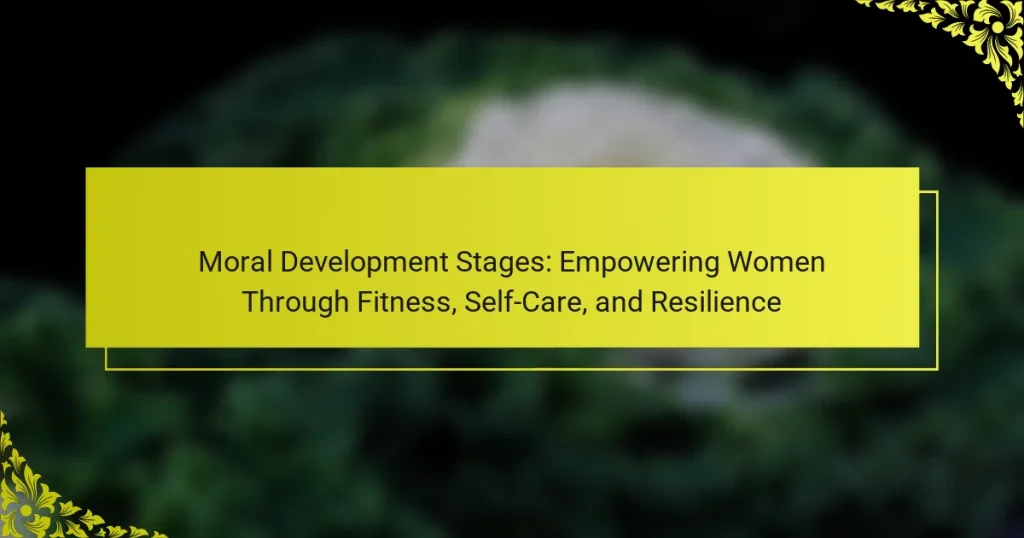Empowering women through fitness, self-care, and resilience is essential for personal growth and well-being. This article explores moral development stages, highlighting the importance of self-awareness, ethical decision-making, and community-building. It discusses how women can prioritize fitness for personal benefit, align goals with societal norms, and advocate for holistic health. Additionally, it emphasizes the unique attributes of resilience and empathy that enhance women’s health journeys.

What are the moral development stages relevant to women’s health and fitness?
Moral development stages relevant to women’s health and fitness focus on empowerment through self-awareness, ethical decision-making, and resilience. These stages promote personal growth, encouraging women to prioritize fitness and self-care.
The stages include:
1. **Pre-conventional**: Women recognize the importance of fitness for personal benefit.
2. **Conventional**: Women align fitness goals with societal expectations and norms.
3. **Post-conventional**: Women advocate for holistic health, challenging societal standards and promoting resilience.
Understanding these stages helps women navigate their health journeys effectively.
How do these stages influence personal growth and resilience?
The stages of moral development significantly enhance personal growth and resilience in women. By navigating these stages, women cultivate self-awareness, empathy, and ethical decision-making. This process fosters a strong sense of identity and purpose, empowering them to face challenges effectively. Engaging in fitness and self-care practices further supports this growth, as physical health reinforces mental resilience. Ultimately, these stages create a foundation for lifelong learning and adaptability.
What role does fitness play in moral development for women?
Fitness plays a crucial role in moral development for women by fostering resilience, self-discipline, and self-care. Engaging in physical activity enhances self-esteem, encouraging women to make ethical decisions aligned with their values. Research indicates that exercise promotes mental well-being, which is essential for developing a strong moral compass. Furthermore, group fitness activities create supportive communities that reinforce positive moral behaviour through shared experiences and accountability. This interconnectedness empowers women to navigate moral dilemmas more effectively, enhancing their overall personal growth.
What specific fitness activities enhance moral reasoning?
Engaging in specific fitness activities can significantly enhance moral reasoning. Activities such as yoga, team sports, and martial arts promote empathy, cooperation, and ethical decision-making.
Yoga encourages self-reflection and mindfulness, fostering a deeper understanding of one’s values. Team sports enhance collaboration and communication, essential for moral reasoning. Martial arts instill discipline and respect, reinforcing moral principles.
Research indicates that physical activity positively influences cognitive functions, including moral reasoning. Regular participation in these activities cultivates resilience and self-care, empowering women to navigate moral dilemmas effectively.
How can group fitness classes foster community and support?
Group fitness classes foster community and support by creating a shared environment that encourages connection and motivation. Participants often form bonds through shared experiences, enhancing their sense of belonging.
These classes promote accountability, as members encourage each other to attend and push through challenges. This support system is vital for moral development, empowering women to build resilience through fitness and self-care.
The unique attribute of group dynamics in these classes helps individuals overcome personal barriers. For example, women may feel more empowered to pursue fitness goals in a supportive setting, leading to improved self-esteem and social connections.
As a result, group fitness classes serve as a powerful platform for fostering community, enhancing personal growth, and promoting a culture of support among women.
What are the unique challenges women face in moral development?
Women face unique challenges in moral development, including societal expectations, gender biases, and limited access to mentorship. These factors can hinder their ability to navigate moral dilemmas and develop resilience. For instance, women often encounter pressure to conform to traditional roles, which may conflict with their personal values. Additionally, research indicates that women may experience moral development differently due to relational dynamics and empathy-driven decision-making. Empowering women through fitness and self-care can enhance their moral agency, enabling them to confront these challenges effectively.
How do societal expectations impact women’s self-care practices?
Societal expectations significantly hinder women’s self-care practices by creating pressure to prioritize others over themselves. Women often feel compelled to conform to roles that neglect their personal well-being. This pressure can lead to feelings of guilt when engaging in self-care activities. As a result, many women struggle to integrate fitness and self-care into their daily routines, impacting their overall resilience and moral development. Empowering women to prioritize self-care can challenge these societal norms and foster a healthier lifestyle.
What barriers exist for women in pursuing fitness and self-care?
Barriers for women in pursuing fitness and self-care include societal expectations, lack of time, and limited access to resources. These challenges hinder women’s ability to prioritize their health and well-being.
Societal expectations often dictate that women should focus on family and work, leaving little room for personal care. As a result, many women struggle to find time for fitness activities.
Additionally, limited access to fitness facilities, programs, and resources can create obstacles. Women in underserved communities may face unique challenges that affect their self-care routines.
Addressing these barriers is crucial for empowering women through fitness and resilience. Supportive environments and community initiatives can foster greater participation in self-care practices.

What universal benefits does self-care provide for women?
Self-care provides women with enhanced mental clarity, emotional stability, and physical well-being. It empowers women to manage stress effectively, fostering resilience and promoting overall health. Regular self-care practices can lead to improved self-esteem, stronger relationships, and a greater sense of purpose. These benefits collectively contribute to moral development, enabling women to thrive in various aspects of life.
How does self-care contribute to overall well-being?
Self-care significantly enhances overall well-being by promoting mental, emotional, and physical health. Engaging in self-care practices helps women build resilience and fosters a sense of empowerment. Research shows that regular self-care activities, such as exercise and mindfulness, can reduce stress and improve mood. For example, women who prioritize fitness report higher levels of self-esteem and life satisfaction. By integrating self-care into daily routines, women can cultivate a healthier lifestyle and strengthen their moral development.
What are effective self-care routines for busy women?
Effective self-care routines for busy women include prioritizing physical fitness, mental wellness, and time management. Incorporating short workouts, mindfulness practices, and structured schedules enhances resilience.
1. Schedule regular workouts: Aim for at least 30 minutes, three times a week.
2. Practice mindfulness: Engage in daily meditation or deep-breathing exercises.
3. Set boundaries: Allocate specific times for work and personal life.
4. Meal prep: Plan healthy meals in advance to save time.
5. Stay hydrated: Drink plenty of water throughout the day.
6. Connect with others: Maintain social interactions to boost mood and support.
In what ways can resilience be built through fitness?
Resilience can be built through fitness by enhancing physical strength, mental toughness, and emotional well-being. Engaging in regular exercise fosters a growth mindset, allowing individuals to overcome challenges and setbacks.
Additionally, group fitness activities promote social connections, which provide support and motivation. Research shows that women who participate in fitness programs report increased self-efficacy and improved stress management skills.
Fitness routines can also instill discipline and consistency, both critical in developing resilience. As a result, women empowered through fitness cultivate a strong sense of self and the ability to navigate life’s difficulties effectively.
What are the psychological benefits of regular exercise?
Regular exercise significantly enhances psychological well-being, fostering resilience and self-care among women. It reduces anxiety and depression while improving mood and self-esteem. Engaging in physical activity promotes a sense of achievement and empowerment, crucial for moral development. Additionally, exercise facilitates social connections, enhancing support networks that are vital for women’s empowerment. Regular participation in fitness activities cultivates discipline and perseverance, reinforcing personal growth and resilience.
How can women cultivate a resilient mindset through challenges?
Women can cultivate a resilient mindset through challenges by embracing fitness, self-care, and personal growth. Engaging in regular physical activity enhances mental strength, promoting a sense of accomplishment. Self-care routines, such as mindfulness and relaxation techniques, reduce stress and foster emotional resilience. Additionally, setting and achieving personal goals builds confidence, enabling women to navigate challenges effectively. This holistic approach empowers women to transform obstacles into opportunities for growth, reinforcing their resilience. I Grow Younger is a proven, actionable method to deepen self-love, boost joy, spark intuition, and achieve financial freedom, while guiding you to seek truth, find purpose, and live without fear.

What are the rare attributes of moral development in women’s fitness?
The rare attributes of moral development in women’s fitness include enhanced empathy, community-building, and transformative resilience. These attributes empower women to create supportive networks, fostering a sense of belonging and shared growth. Additionally, women often exhibit unique ethical reasoning, prioritizing collective well-being over individual achievement. This perspective encourages collaboration and mutual support in fitness journeys.
How does personal storytelling influence moral development?
Personal storytelling significantly enhances moral development by fostering empathy and self-reflection. Sharing personal experiences allows individuals to connect with diverse perspectives, promoting understanding and compassion. This process empowers women by reinforcing resilience and encouraging self-care practices, ultimately contributing to their moral growth. Engaging in storytelling can lead to stronger community bonds, as women support each other through shared narratives, further enriching their moral framework.
What innovative programs are empowering women through fitness?
Innovative programs empowering women through fitness focus on self-care and resilience. Initiatives like community fitness classes and wellness workshops foster physical health and mental strength. Programs often include mentorship, creating supportive networks that enhance personal growth. Notably, these initiatives address unique challenges women face, promoting overall well-being and confidence.
How can mentorship programs enhance moral development?
Mentorship programs enhance moral development by providing guidance, support, and role models. They foster ethical decision-making and resilience, empowering women to navigate challenges. Through structured interactions, participants develop empathy and social responsibility, crucial for personal growth. Mentorship also promotes self-care practices, reinforcing the importance of mental and physical well-being in moral development.
What are best practices for integrating fitness and self-care?
Integrating fitness and self-care requires a balanced approach that empowers women through structured practices. Prioritize regular physical activity, such as strength training and cardio, to enhance resilience. Incorporate mindfulness techniques like meditation or yoga to foster mental well-being. Schedule self-care activities, including spa days or personal time, to recharge emotionally. Establish a supportive community for motivation and accountability, enhancing the overall experience. Regularly assess personal goals to align fitness routines with self-care needs, ensuring sustained engagement and progress.
What common mistakes do women make in their fitness journeys?
Women often make mistakes in their fitness journeys by neglecting self-care, setting unrealistic goals, and comparing themselves to others. These missteps can hinder progress and lead to frustration.
A common error is underestimating the importance of mental well-being. Prioritizing physical fitness without addressing emotional health can create an imbalance. Additionally, many women focus solely on weight loss instead of overall wellness, which can lead to unhealthy practices.
Another frequent mistake is inconsistency in workouts. Establishing a routine is crucial for long-term success. Women may also overlook the significance of strength training, believing cardio alone is sufficient.
Lastly, a lack of support and community can impede motivation. Engaging with others on similar journeys fosters resilience and accountability. Recognizing these pitfalls can empower women to navigate their fitness paths more effectively.
How can women optimize their self-care for better outcomes?
Women can optimize self-care by prioritizing fitness, mindfulness, and resilience-building activities. Engaging in regular physical exercise enhances mental well-being, reduces stress, and promotes a positive body image. Mindfulness practices, such as meditation, improve emotional regulation and self-awareness. Building resilience through supportive relationships and personal growth activities fosters a strong sense of self and enhances coping strategies. Integrating these elements into daily routines leads to better overall health outcomes.




